外研版(2019)必修 第一册Unit 3 Family matters Using language Grammar 课件(共14张PPT)
文档属性
| 名称 | 外研版(2019)必修 第一册Unit 3 Family matters Using language Grammar 课件(共14张PPT) | 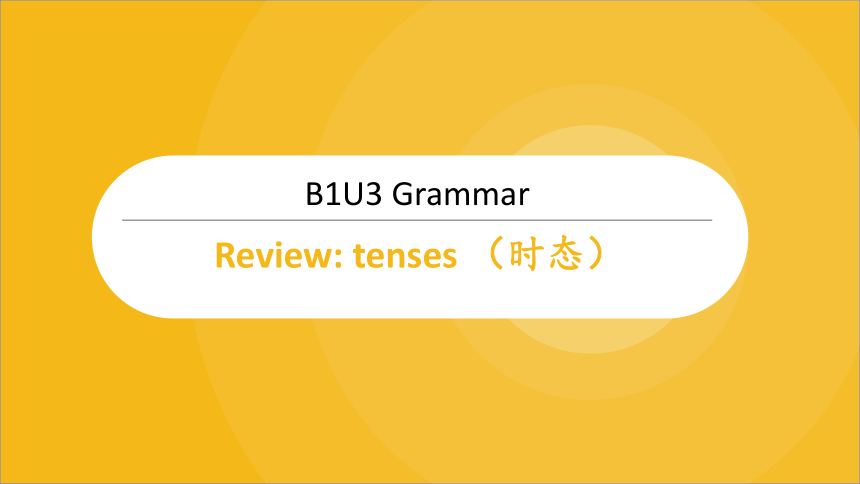 | |
| 格式 | pptx | ||
| 文件大小 | 938.9KB | ||
| 资源类型 | 教案 | ||
| 版本资源 | 外研版(2019) | ||
| 科目 | 英语 | ||
| 更新时间 | 2024-07-21 21:06:17 | ||
图片预览

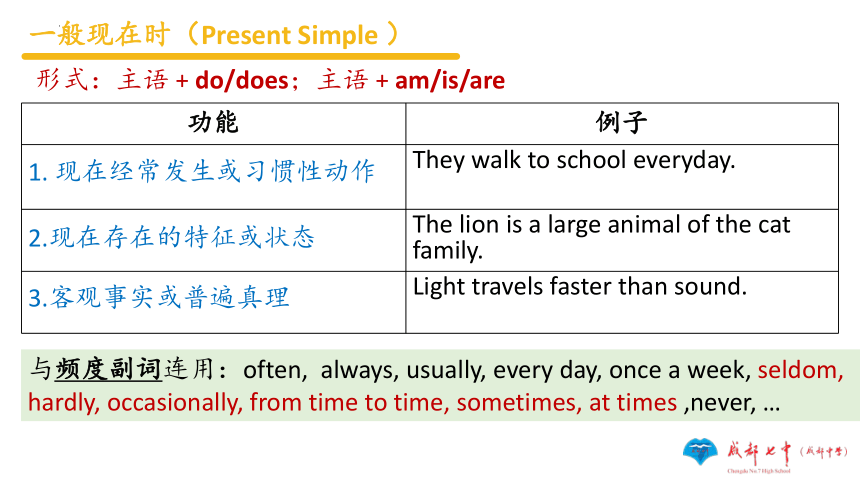
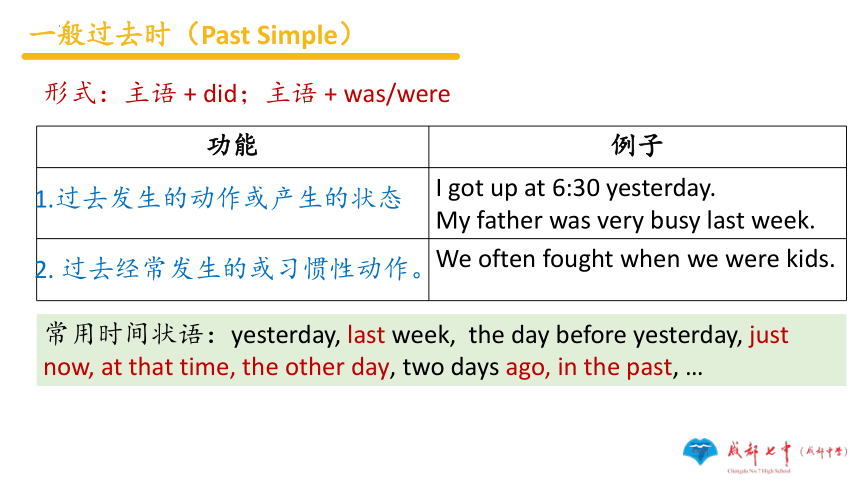
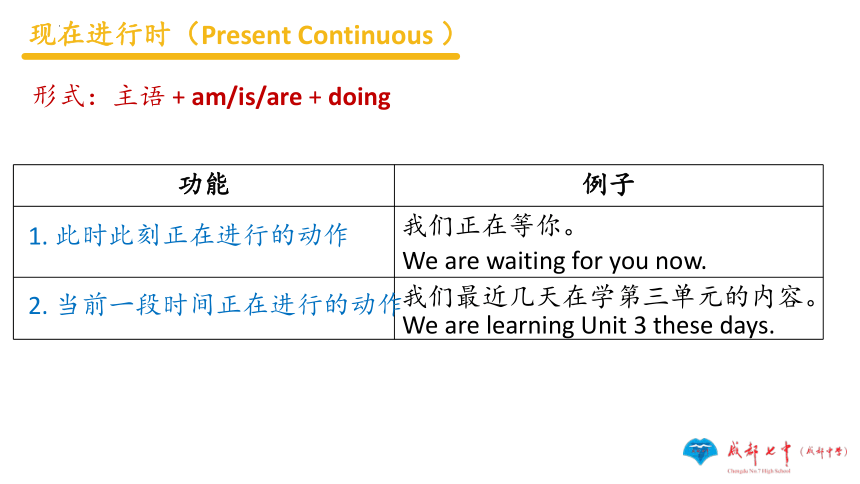
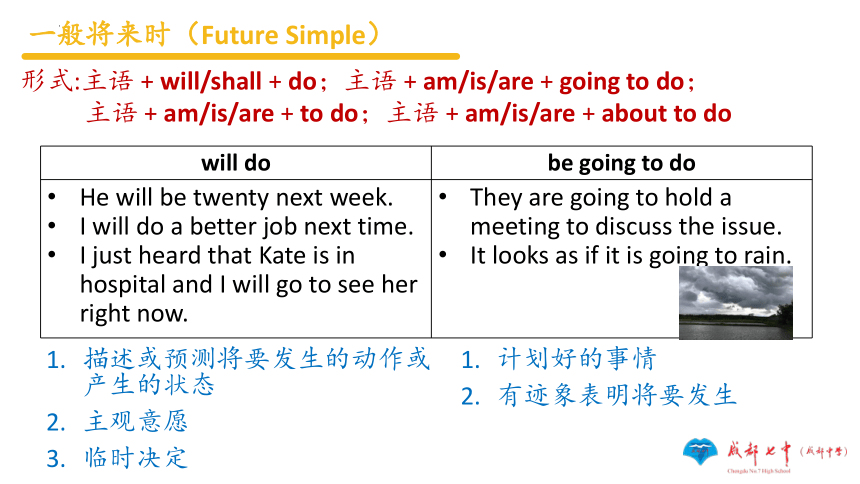
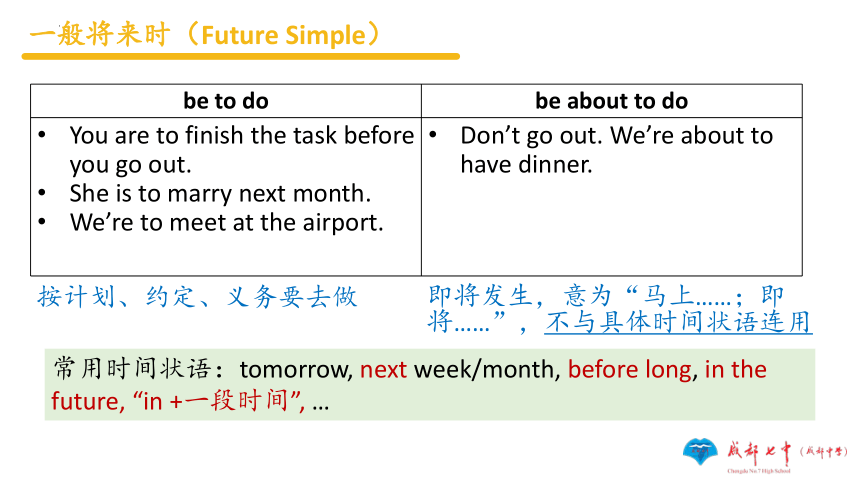
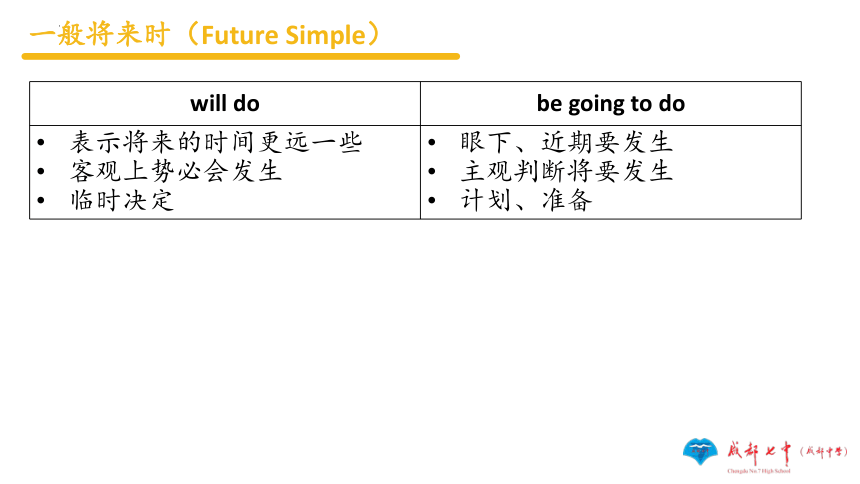
文档简介
(共14张PPT)
B1U3 Grammar
Review: tenses (时态)
形式:主语 + do/does;主语 + am/is/are
一般现在时(Present Simple )
功能 例子
They walk to school everyday.
The lion is a large animal of the cat family.
Light travels faster than sound.
1. 现在经常发生或习惯性动作
2.现在存在的特征或状态
3.客观事实或普遍真理
与频度副词连用:often, always, usually, every day, once a week, seldom, hardly, occasionally, from time to time, sometimes, at times ,never, …
形式:主语 + did;主语 + was/were
功能 例子
I got up at 6:30 yesterday.
My father was very busy last week.
We often fought when we were kids.
一般过去时(Past Simple)
1.过去发生的动作或产生的状态
2. 过去经常发生的或习惯性动作。
常用时间状语:yesterday, last week, the day before yesterday, just now, at that time, the other day, two days ago, in the past, …
形式:主语 + am/is/are + doing
We are waiting for you now.
We are learning Unit 3 these days.
现在进行时(Present Continuous )
功能 例子
我们正在等你。
我们最近几天在学第三单元的内容。
1. 此时此刻正在进行的动作
2. 当前一段时间正在进行的动作
will do be going to do
He will be twenty next week. I will do a better job next time. I just heard that Kate is in hospital and I will go to see her right now. They are going to hold a meeting to discuss the issue.
It looks as if it is going to rain.
形式:主语 + will/shall + do;主语 + am/is/are + going to do;
主语 + am/is/are + to do;主语 + am/is/are + about to do
描述或预测将要发生的动作或产生的状态
主观意愿
临时决定
一般将来时(Future Simple)
计划好的事情
有迹象表明将要发生
be to do be about to do
You are to finish the task before you go out. She is to marry next month. We’re to meet at the airport. Don’t go out. We’re about to have dinner.
按计划、约定、义务要去做
一般将来时(Future Simple)
即将发生,意为“马上……;即将……”,不与具体时间状语连用
常用时间状语:tomorrow, next week/month, before long, in the future, “in +一段时间”, …
一般将来时(Future Simple)
will do be going to do
表示将来的时间更远一些 客观上势必会发生 临时决定 眼下、近期要发生
主观判断将要发生
计划、准备
Exercises (be going to VS. will)
Autumn__________ come again.
I ______________ apply for living at school during the school year.
If you don’t hurry, you __________ miss your English class.
– Listen! The doorbell is ringing.
– I __________ go.
Look at the dark clouds. It __________ rain.
Fish __________ die without water.
am going to/will
is going to
will
will
will
will
Exercises
1. Jack ________swimming in the river every day in summer.(go)
2. It ________ that you are right.(seem)
3. Look, the children ________ basketball on the play-ground.(play)
5. It is very wet and cold. I think it ________.(rain)
6.—I need some paper.
—I ________ some for you.(bring)
7. I can't find my pen. Who ________ it away (take)
8. He ________back in five minutes.(come)
10. I ________ my bike, so I have to walk to school.(lose)
goes
seems
are playing
is going to rain
will bring
has taken
will come
(have) lost
Exercises
11. He ________ down and began to read his newspaper. (sit)
12. He is very hungry. He ________ anything for three days.(not eat)
13. I ________ with you if I have time.(go)
14. We will go to the cinema if it ________ fine tomorrow. (be)
15. I will tell her the news when I ________ her next week. (meet)
17. We ________ good friends since we met at school.(be)
19. The bike is nice. How much ________ it ________ (cost)
20. I don't know when Mary ________ to see me. But when she ________,I’ll tell her all about it.(come)
sat
hasn’t eaten
will go
is
meet
have been
does
cost
will come
comes
功能 例子
他钥匙丢了,进不去门。
他从上周开始工作一直很忙。
我去过长城两次。
现在完成时(Present Perfect)
形式:主语 + have/has + done
He has lost his key and now he can’t get inside.
1.过去发生的动作对现在产生的结果、影响
2.过去的动作或状态持续到现在
never, ever, only, once, twice, before
since +过去时间点
for +一段时间
He has been very busy since last week.
I’ve been to the Great Wall twice.
3.描述过去的人生经历
现在完成时肯定句中,瞬间动词不能与时间段连用。
现在完成时肯定句:V延 + 一段时间
翻译:我上高中已经一个月了。
I have been in senior high for a month.
I have entered senior high for a month. ×
现在完成时否定句:V延/V瞬 + 一段时间
翻译:她有三周没来学校了。
She haven’t been in school for 3 weeks.
翻译:我有三个月没收到他的来信了。
I haven’t heard from him for 3 months.
一般过去时VS. 现在完成时
A1: He has lost his key and now he can’t get inside.
A2: He lost his key but luckily he found it.
B1: He has been very busy since last week, so he may not come to your party tonight.
B2: He was very busy last week, but this week it’s better.
C1: Tom studied in Chengdu No. 7 High School for 3 years.
C2: I have studied in Chengdu No. 7 High School for 1 month.
一般过去时:动作和状态发生并结束于过去,与现在无关。
现在完成时:动作和状态始于过去,对现在有影响。
1 Something that started in the past and is affecting the present.
2 Something that is currently taking place.
3 Something that is certain to take place in the future.
4 Something that was completed in the past.
5 Something that happens regularly in the present.
Match the definitions (定义) to the correct timeline(P38, A1).
现在完成时
现在进行时
一般将来时
一般过去时
一般现在时
B1U3 Grammar
Review: tenses (时态)
形式:主语 + do/does;主语 + am/is/are
一般现在时(Present Simple )
功能 例子
They walk to school everyday.
The lion is a large animal of the cat family.
Light travels faster than sound.
1. 现在经常发生或习惯性动作
2.现在存在的特征或状态
3.客观事实或普遍真理
与频度副词连用:often, always, usually, every day, once a week, seldom, hardly, occasionally, from time to time, sometimes, at times ,never, …
形式:主语 + did;主语 + was/were
功能 例子
I got up at 6:30 yesterday.
My father was very busy last week.
We often fought when we were kids.
一般过去时(Past Simple)
1.过去发生的动作或产生的状态
2. 过去经常发生的或习惯性动作。
常用时间状语:yesterday, last week, the day before yesterday, just now, at that time, the other day, two days ago, in the past, …
形式:主语 + am/is/are + doing
We are waiting for you now.
We are learning Unit 3 these days.
现在进行时(Present Continuous )
功能 例子
我们正在等你。
我们最近几天在学第三单元的内容。
1. 此时此刻正在进行的动作
2. 当前一段时间正在进行的动作
will do be going to do
He will be twenty next week. I will do a better job next time. I just heard that Kate is in hospital and I will go to see her right now. They are going to hold a meeting to discuss the issue.
It looks as if it is going to rain.
形式:主语 + will/shall + do;主语 + am/is/are + going to do;
主语 + am/is/are + to do;主语 + am/is/are + about to do
描述或预测将要发生的动作或产生的状态
主观意愿
临时决定
一般将来时(Future Simple)
计划好的事情
有迹象表明将要发生
be to do be about to do
You are to finish the task before you go out. She is to marry next month. We’re to meet at the airport. Don’t go out. We’re about to have dinner.
按计划、约定、义务要去做
一般将来时(Future Simple)
即将发生,意为“马上……;即将……”,不与具体时间状语连用
常用时间状语:tomorrow, next week/month, before long, in the future, “in +一段时间”, …
一般将来时(Future Simple)
will do be going to do
表示将来的时间更远一些 客观上势必会发生 临时决定 眼下、近期要发生
主观判断将要发生
计划、准备
Exercises (be going to VS. will)
Autumn__________ come again.
I ______________ apply for living at school during the school year.
If you don’t hurry, you __________ miss your English class.
– Listen! The doorbell is ringing.
– I __________ go.
Look at the dark clouds. It __________ rain.
Fish __________ die without water.
am going to/will
is going to
will
will
will
will
Exercises
1. Jack ________swimming in the river every day in summer.(go)
2. It ________ that you are right.(seem)
3. Look, the children ________ basketball on the play-ground.(play)
5. It is very wet and cold. I think it ________.(rain)
6.—I need some paper.
—I ________ some for you.(bring)
7. I can't find my pen. Who ________ it away (take)
8. He ________back in five minutes.(come)
10. I ________ my bike, so I have to walk to school.(lose)
goes
seems
are playing
is going to rain
will bring
has taken
will come
(have) lost
Exercises
11. He ________ down and began to read his newspaper. (sit)
12. He is very hungry. He ________ anything for three days.(not eat)
13. I ________ with you if I have time.(go)
14. We will go to the cinema if it ________ fine tomorrow. (be)
15. I will tell her the news when I ________ her next week. (meet)
17. We ________ good friends since we met at school.(be)
19. The bike is nice. How much ________ it ________ (cost)
20. I don't know when Mary ________ to see me. But when she ________,I’ll tell her all about it.(come)
sat
hasn’t eaten
will go
is
meet
have been
does
cost
will come
comes
功能 例子
他钥匙丢了,进不去门。
他从上周开始工作一直很忙。
我去过长城两次。
现在完成时(Present Perfect)
形式:主语 + have/has + done
He has lost his key and now he can’t get inside.
1.过去发生的动作对现在产生的结果、影响
2.过去的动作或状态持续到现在
never, ever, only, once, twice, before
since +过去时间点
for +一段时间
He has been very busy since last week.
I’ve been to the Great Wall twice.
3.描述过去的人生经历
现在完成时肯定句中,瞬间动词不能与时间段连用。
现在完成时肯定句:V延 + 一段时间
翻译:我上高中已经一个月了。
I have been in senior high for a month.
I have entered senior high for a month. ×
现在完成时否定句:V延/V瞬 + 一段时间
翻译:她有三周没来学校了。
She haven’t been in school for 3 weeks.
翻译:我有三个月没收到他的来信了。
I haven’t heard from him for 3 months.
一般过去时VS. 现在完成时
A1: He has lost his key and now he can’t get inside.
A2: He lost his key but luckily he found it.
B1: He has been very busy since last week, so he may not come to your party tonight.
B2: He was very busy last week, but this week it’s better.
C1: Tom studied in Chengdu No. 7 High School for 3 years.
C2: I have studied in Chengdu No. 7 High School for 1 month.
一般过去时:动作和状态发生并结束于过去,与现在无关。
现在完成时:动作和状态始于过去,对现在有影响。
1 Something that started in the past and is affecting the present.
2 Something that is currently taking place.
3 Something that is certain to take place in the future.
4 Something that was completed in the past.
5 Something that happens regularly in the present.
Match the definitions (定义) to the correct timeline(P38, A1).
现在完成时
现在进行时
一般将来时
一般过去时
一般现在时
